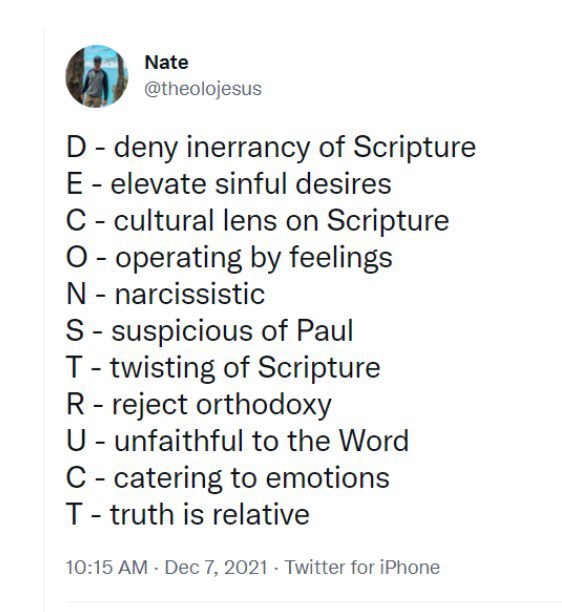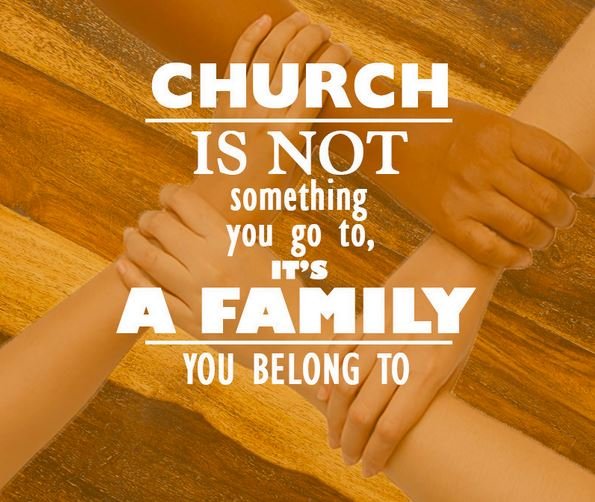
Recently, Jacob Crouch, a nursing professor at Mississippi College in Clinton, Mississippi, and a music coordinator at Grace Community Church in Jackson, Mississippi, wrote a post titled Deconversion is Apostasy. Here’s some of what he had to say:
The word “deconversion”, defined simply as the loss of faith in one’s religion, seems to have become popular recently. People have become weirdly comfortable, almost boasting, in the fact that they have deconverted from Christianity. I think part of the comfort with deconversion is that the word is new enough to lack the sober connotations its meaning should convey. We often do this: we soften language to appease our consciences. So I want to say it out loud for those who might be dodging the seriousness of what deconverting from Christianity really means: Deconversion is apostasy.
When someone says, “I’ve deconverted” or “I’m an exvangelical” or “I’ve deconstructed”, I’m convinced that they choose this heady, pseudo-intellectual language because it allows the conscience to miss what they’ve actually done. Those who deconvert are leaving Christ. They are those whom the Spirit says, “will depart from the faith” (1 Tim 4:1). They are the ones who have, “an evil, unbelieving heart, leading [them] to fall away from the living God” (Heb 3:12). This is a serious and dangerous decision.
….
May we be faithful to expose the serious nature of deconversion, and let us be encouraged to pray and love our deconverting neighbors and family members.
Rarely does a week go by that I don’t read a blog post or article written by an Evangelical about those who are leaving Christianity. The numbers speak for themselves. Evangelicalism is hemorrhaging believers left and right. Led by the Holy Ghost to opine on deconversion/deconstruction, Crouch concludes that ex-Evangelicals are, by using terms such as deconversion, deconstruction, and exevangelical to describe themselves, “dodging the seriousness of what deconverting from Christianity really means: Deconversion is apostasy.”
Ex-Evangelicals are some of the most honest people I know; people who are willing to be brutally honest about their past and present lives. Hiding shit is not in the DNA. So, to suggest former Christians hide behind terms such as deconversion, deconstruction, and exevangelical to avoid accountability for their apostasy (and heresy) is absurd. In fact, most ex-Evangelicals I know — and I know lots of them — have no problem with the apostate label.
Of course we are apostates — proudly so. The difference between ex-Evangelicals’ use of the word apostasy and Crouch’s is that the word has no power for unbelievers. For Crouch and others like him, apostasy leads to God’s judgment and eternal punishment in the Lake of Fire. Such a fearful thing, right? Not for ex-Evangelicals. To them, Crouch’s beliefs are myths. We are not worried in the least that “God is gonna get us.” While deconversion has many components, fundamentally, those who deconvert from a system of belief no longer “believe” the central tenets of that system. Many ex-Evangelicals still “believe” in some sense or the other. Many ex-Evangelicals still believe in Jesus or have some sense that a deity of some sort exists. Their objections are to Evangelical beliefs and practices. Sure, some ex-Evangelicals are agnostics or atheists, but that cannot be said of all of them.
I wonder if Crouch has talked to many ex-Evangelicals? I doubt it. If he had, I seriously doubt he would say that their choice of self-identifiers is due to trying to “appease our consciences.” Does he even know what ex-Evangelicals think about the human conscience, to start with? Crouch assumes facts that are not in evidence. How does he know that ex-Evangelicals use these labels to appease their consciences; that we use “pseudo-intellectual” terms because it allows our “consciences” to miss what we have really done: leaving Christ?
Is Crouch serious? Does he really think ex-Evangelicals are not self-aware of what they have done? Child, please. We blew up our lives when we deconverted. We lost almost everything we held dear. We lost family, friends, and colleagues. I lost ALL of my Evangelical friends and colleagues in the ministry. A-l-l of them. Fifty years of my life went up in smoke the moment I said I was no longer a Christian. (Please see Dear Family, Friends, and Former Parishioners.) I am quite self-aware of the price I have paid for divorcing Jesus, as are most deconverts.
Crouch calls on his fellow Evangelicals (true Christians) to pray for “deconverting neighbors and family members.” Pray if you must — it won’t make a difference — but I suggest a better approach might be to actually get to know people who have deconverted, who are no longer Evangelical Christians. If Crouch had done so, he never would have written his post.
Do better, Jacob, do better.
Bruce Gerencser, 68, lives in rural Northwest Ohio with his wife of 47 years. He and his wife have six grown children and sixteen grandchildren. Bruce pastored Evangelical churches for twenty-five years in Ohio, Texas, and Michigan. Bruce left the ministry in 2005, and in 2008 he left Christianity. Bruce is now a humanist and an atheist.
Your comments are welcome and appreciated. All first-time comments are moderated. Please read the commenting rules before commenting.
You can email Bruce via the Contact Form.









